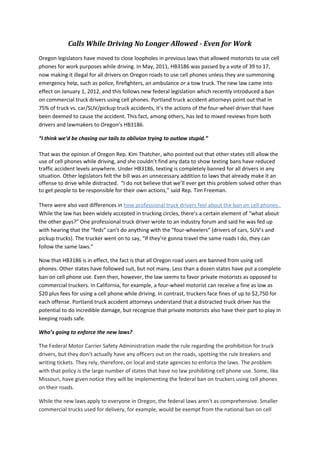
Oregon Law: Calls for Work While Driving Prohibited
- 1. Calls While Driving No Longer Allowed - Even for Work Oregon legislators have moved to close loopholes in previous laws that allowed motorists to use cell phones for work purposes while driving. In May, 2011, HB3186 was passed by a vote of 39 to 17, now making it illegal for all drivers on Oregon roads to use cell phones unless they are summoning emergency help, such as police, firefighters, an ambulance or a tow truck. The new law came into effect on January 1, 2012, and this follows new federal legislation which recently introduced a ban on commercial truck drivers using cell phones. Portland truck accident attorneys point out that in 75% of truck vs. car/SUV/pickup truck accidents, it’s the actions of the four-wheel driver that have been deemed to cause the accident. This fact, among others, has led to mixed reviews from both drivers and lawmakers to Oregon’s HB3186. “I think we’d be chasing our tails to oblivion trying to outlaw stupid.” That was the opinion of Oregon Rep. Kim Thatcher, who pointed out that other states still allow the use of cell phones while driving, and she couldn’t find any data to show texting bans have reduced traffic accident levels anywhere. Under HB3186, texting is completely banned for all drivers in any situation. Other legislators felt the bill was an unnecessary addition to laws that already make it an offense to drive while distracted. “I do not believe that we’ll ever get this problem solved other than to get people to be responsible for their own actions,” said Rep. Tim Freeman. There were also vast differences in how professional truck drivers feel about the ban on cell phones . While the law has been widely accepted in trucking circles, there’s a certain element of “what about the other guys?” One professional truck driver wrote to an industry forum and said he was fed up with hearing that the “feds” can’t do anything with the “four-wheelers” (drivers of cars, SUV’s and pickup trucks). The trucker went on to say, “If they’re gonna travel the same roads I do, they can follow the same laws.” Now that HB3186 is in effect, the fact is that all Oregon road users are banned from using cell phones. Other states have followed suit, but not many. Less than a dozen states have put a complete ban on cell phone use. Even then, however, the law seems to favor private motorists as opposed to commercial truckers. In California, for example, a four-wheel motorist can receive a fine as low as $20 plus fees for using a cell phone while driving. In contrast, truckers face fines of up to $2,750 for each offense. Portland truck accident attorneys understand that a distracted truck driver has the potential to do incredible damage, but recognize that private motorists also have their part to play in keeping roads safe. Who’s going to enforce the new laws? The Federal Motor Carrier Safety Administration made the rule regarding the prohibition for truck drivers, but they don’t actually have any officers out on the roads, spotting the rule breakers and writing tickets. They rely, therefore, on local and state agencies to enforce the laws. The problem with that policy is the large number of states that have no law prohibiting cell phone use. Some, like Missouri, have given notice they will be implementing the federal ban on truckers using cell phones on their roads. While the new laws apply to everyone in Oregon, the federal laws aren’t as comprehensive. Smaller commercial trucks used for delivery, for example, would be exempt from the national ban on cell
- 2. phone use. The federal legislation is aimed at large trucks involved in interstate commerce, and those hauling hazardous materials. CB and hands free Some drivers found it both interesting and ironic that there’s nothing in the new laws, including Oregon’s HB3186, which bans the use of CB radios. One professional driver said, “The CB is way more distracting (and) annoying than a cell phone.” Truck drivers feel that because there is no way of recording whether or not a CB was being used to make or receive a call when an accident occurred, unlike cell phones, it simply wouldn’t be feasible to create or enforce legislation against their use. Portland truck accident attorneys have seen the damage done to property and people by drivers who have been distracted while talking on a cell phone. Opinion is divided on whether or not hands free devices are the answer, as studies seem to point out that even these will not prevent a driver from losing some level of concentration on what’s happening around him. Nevertheless, it’s believed in-dash technology on both trucks and cars will soon develop to the point where all new vehicles will be set up for drivers to make and receive calls without taking their hands off the wheel. The trucking industry is already heavily legislated, and most professional drivers feel safety is the absolute bottom line. The American Trucking Association has welcomed the national ban on truck drivers using cell phones, and in Oregon, HB3186 has made it illegal for anyone to talk or text while driving. There’s no question, however, that “stupid” just can’t be outlawed, and as long as that’s the case, accidents will happen and people will get hurt. If you have been injured by a truck driver, whether or not he or she was on a cell phone, it’s important that you contact a specialist team of Portland truck accident attorneys, who will protect your interests and deal with the trucking firm’s insurance company. Choose a firm which has experience of this type of accident, who will guide you through the process step by step.
